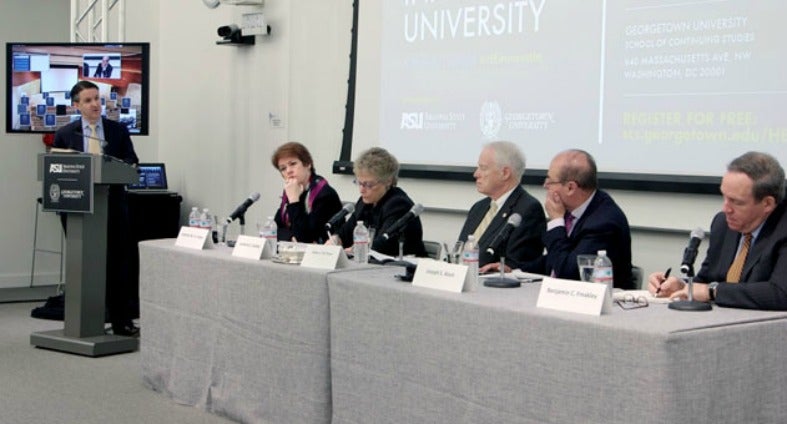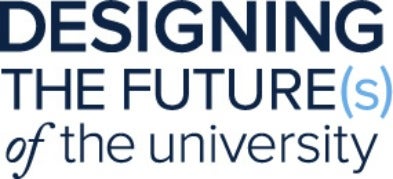Title: University Presidents: Experts Explore their Future Needs
Georgetown and Arizona State universities hosts a public forum on how to develop the next generation of higher education leaders.

Author and higher education expert Jeffrey Selingo and other industry leaders explored how to shape the next generation of university presidents during a public forum today at Georgetown’s downtown campus.
Co-hosted by Georgetown and Arizona State University, “Leadership for the Innovative University,” also included remarks by Georgetown President John J. DeGioia and Arizona State President Michael Crow.
Georgetown and Arizona State have announced a new partnership to examine the future of higher education.
Innovation the Key
Selingo, a professor of practice at Arizona State University, said there’s been a lot of discussion about the future of higher education, but a key element missing from those talks is “leadership at all levels – faculty, trustees, senior administrators and, most importantly, presidents.”
“Unlike the business world, where business school is now seen as the price of entry for a CEO, there really is no specified training pathway for the college presidents, trustees or even for other leaders on campus,” said Selingo, also a senior advisor to DeGioia and author of College (Un)Bound: The Future of Higher Education and What It Means for Students.
“There’s a need in our economy to educate more, better, faster and at a lower cost,” Crow said. “Add to that the changing global complexities on nearly every front imaginable, and you might say it’s a time for innovation in higher education … the one area that’s not getting enough attention is leadership in higher education that can be stimulating innovation.”
Changing Workplace Cultures
Panelists for the event included Joseph Aoun, president of Northeastern University, and retired Army Lt. Gen. Benjamin Freakley, professor of practice of leadership at Arizona State.
Also on hand was Heather Fraser, co-founder of Rotman DesignWorks at the University of Toronto and author of Design Works: How Tackle Your Toughest Innovation Challenges through Business Design; William “Brit” Kirwan, chancellor of the University System of Maryland; and Jamienne Studley, acting deputy under secretary in the U.S. Department of Education.
The panelists concluded that grooming potential leaders at a young age and looking outside the “walls” of academia would help in ensuring that university presidents are prepared for their jobs, as well as looking for leaders who know that changing workplace cultures takes determination and persistence.
Future of Higher Ed

“The work that we begin this morning comes as our two universities explore important questions facing higher education, experiment with creative solutions to meet new needs and seek to identify the characteristics that define the type of innovative leadership that will guide the academy through these early years of this 21st century,” DeGioia said.
The event was a part of Georgetown’s initiative examining the future of higher education.
In November 2013, Georgetown launched Designing the Future(s) of the University, an integrative initiative that engages the campus community in exploring issues facinghigher education and experiments with new ways to deliver that education into thefuture.